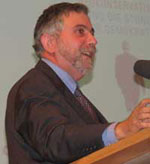Paul Krugman
(1953-)

Paul Krugman is a professor of economics and international affairs at Princeton University and a columnist for The New York Times. In 2008, Krugman won the Nobel Prize in Economics for “his analysis of trade patterns and location of economic activity.”
A press release from the Royal Swedish academy of sciences said this about Krugman’s work:
Patterns of trade and location have always been key issues in the economic debate. What are the effects of free trade and globalization? What are the driving forces behind worldwide urbanization? Paul Krugman has formulated a new theory to answer these questions. He has thereby integrated the previously disparate research fields of international trade and economic geography.
Krugman’s approach is based on the premise that many goods and services can be produced more cheaply in long series, a concept generally known as economies of scale. Meanwhile, consumers demand a varied supply of goods. As a result, small-scale production for a local market is replaced by large-scale production for the world market, where firms with similar products compete with one another.
Traditional trade theory assumes that countries are different and explains why some countries export agricultural products whereas others export industrial goods. The new theory clarifies why worldwide trade is in fact dominated by countries which not only have similar conditions, but also trade in similar products – for instance, a country such as Sweden that both exports and imports cars. This kind of trade enables specialization and large-scale production, which result in lower prices and a greater diversity of commodities.
Economies of scale combined with reduced transport costs also help to explain why an increasingly larger share of the world population lives in cities and why similar economic activities are concentrated in the same locations. Lower transport costs can trigger a self-reinforcing process whereby a growing metropolitan population gives rise to increased large-scale production, higher real wages and a more diversified supply of goods. This, in turn, stimulates further migration to cities. Krugman’s theories have shown that the outcome of these processes can well be that regions become divided into a high-technology urbanized core and a less developed “periphery”.
Sources: Nobel Prize Website


